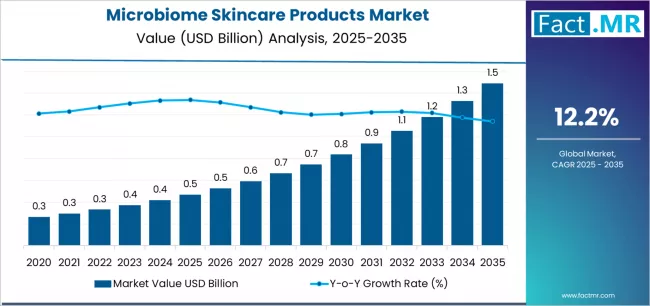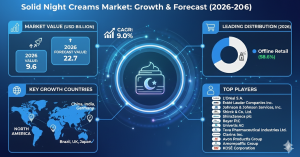The global microbiome skincare products market is on a strong upward trajectory, driven by heightened consumer focus on skin health, personalized beauty solutions, and science-backed formulations. According to a recent analysis, the market is projected to grow from USD 0.47 billion in 2025 to USD 1.49 billion by 2035, marking an absolute increase of USD 1.02 billion and a powerful CAGR of 12.2% during the forecast period.
Microbiome skincare—centered on balancing the skin’s natural ecosystem of beneficial microorganisms—is emerging as a transformative category in the beauty and personal care industry. As consumers seek targeted, functional, and health-aligned skincare solutions, brands are rapidly adopting microbiome-focused innovations across product portfolios.
Key Market Drivers
Rising Consumer Interest in Skin Barrier Health and Personalized Beauty
Growing awareness of the skin microbiome’s role in hydration, resilience, and inflammation control is driving adoption of microbiome-based products. Consumers are prioritizing barrier repair and microbiome-friendly formulations that support long-term skin wellness rather than temporary cosmetic results.
Probiotic, prebiotic, and postbiotic ingredients are gaining traction in moisturizers, serums, cleansers, and targeted treatments, fueling category expansion.
Surge in Demand for Clean, Science-Backed Skincare
As the clean beauty movement evolves, microbiome skincare stands at the intersection of natural wellness and dermatological innovation. Products formulated without harsh chemicals—yet powered by clinically-studied active compounds—are capturing significant attention. This shift is pushing premium and mainstream brands to introduce microbiome-supportive ranges with minimal irritants and maximum efficacy.
Advancements in Dermatology and Biotechnology
Ongoing breakthroughs in microbiome sequencing, skin flora mapping, and biotech-enabled ingredient development are expanding the possibilities for personalized skincare. Manufacturers are leveraging scientific insights to create tailored solutions addressing acne, sensitivity, eczema-prone skin, and premature aging. The growing collaboration between biotech firms and cosmetic companies is further accelerating innovation.
Browse Full Report: https://www.factmr.com/report/microbiome-skincare-products-market
Regional Growth Highlights
North America: Leading Through Innovation and Awareness
The U.S. remains the largest market due to high awareness of probiotic-based skincare, strong presence of premium beauty brands, and rapid adoption of clinically-driven formulations. Demand for personalized and sensitivity-focused skincare continues to surge.
Europe: Stronghold for Clean Beauty and Dermatology Expertise
European consumers show strong affinity for natural, microbiome-safe, and dermatologically approved products. Countries such as France, Germany, and the U.K. are key contributors to market growth, supported by stringent cosmetic regulations and rising demand for advanced barrier-repair solutions.
Asia-Pacific: Fastest-Growing Region
Emerging consumer focus on anti-pollution skincare, sensitive skin solutions, and holistic beauty is boosting microbiome product adoption in Japan, South Korea, China, and Australia. K-beauty and J-beauty brands are actively integrating microbiome-friendly technologies into new product lines.
Latin America & Middle East: Rising Premiumization
Growing penetration of international beauty brands and supply chain expansion are strengthening uptake across Brazil, Mexico, GCC countries, and South Africa.
Market Segmentation Insights
By Product Type
- Probiotic Skincare Products – Rapidly expanding due to their targeted repair and protective benefits.
- Prebiotic Skincare Products – Gaining traction for balancing the skin’s ecosystem and promoting healthy flora.
- Postbiotic Skincare Products – Increasingly used in advanced anti-aging and sensitive-skin treatments.
By Skin Concern
- Anti-Aging – High demand for microbiome-based wrinkle-reduction and elasticity-enhancing formulations.
- Acne & Blemishes – Growing usage of microbiome-balancing solutions to manage breakouts.
- Sensitivity & Redness – A major consumer segment benefiting from microbiome-calming ingredients.
- Dry & Dehydrated Skin – Strong adoption of barrier-strengthening, microbiome-safe moisturizers.
By Distribution Channel
- Online Retail – Fastest-growing channel due to D2C skincare brands and consumer preference for ingredient transparency.
- Specialty Stores & Pharmacies – Trusted outlets for science-backed, dermatologist-recommended products.
- Supermarkets/Hypermarkets – Expanding presence of affordable microbiome-friendly skincare ranges.
Market Challenges
Despite exceptional growth potential, several barriers persist:
- High Cost of Biotech Ingredients: Advanced probiotic and postbiotic compounds raise product prices.
- Regulatory Complexities: Standardized global guidelines for microbiome claims remain limited.
- Consumer Education Gaps: Many consumers are unaware of microbiome benefits, slowing mass adoption.
- Formulation Challenges: Maintaining microbial stability and efficacy requires advanced expertise and technology.
Competitive Landscape
The microbiome skincare market is moderately consolidated, with companies expanding investment in biotechnology partnerships, clinical testing, and premium product development. Brands are focusing on transparent formulations, clean-label authentication, and personalized skincare solutions.
Prominent Companies Include:
- Mother Dirt
- Esse Skincare
- Aurelia London
- Gallinée
- TULA Skincare
- La Roche-Posay
- Dermala
- Yun Probiotherapy
These players are actively launching microbiome-focused product lines, leveraging digital platforms for consumer education, and collaborating with dermatologists to enhance legitimacy and trust.
Future Outlook: A New Era of Skin-Health-First Beauty
Over the next decade, microbiome skincare is poised to transition from a niche science-backed segment to a mainstream beauty essential. As consumers increasingly prioritize skin-barrier health, personalized solutions, and clean-label credibility, microbiome formulations will form the backbone of next-generation skincare products.
Manufacturers that invest in research partnerships, transparent labeling, biotech-enabled ingredients, and digital consumer engagement will be best positioned to lead this high-growth market. The sector’s evolution will redefine skincare—from cosmetic enhancement to holistic skin health and microbiome balance.



